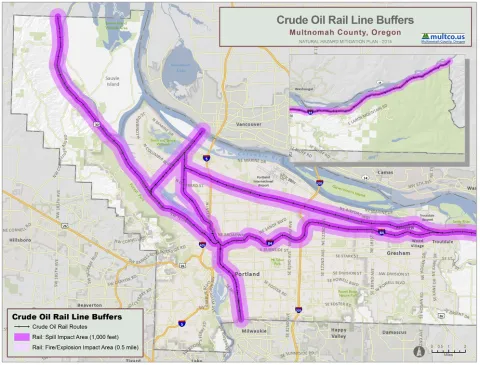
The Office of Sustainability has completed a briefing that assesses the community risk of shipping crude oil by rail through Multnomah County. The purpose of the assessment is to 1) Assess the potential negative impact of an accident involving train car(s) carrying crude oil traveling through populated areas in Multnomah County; and 2) estimate whether the potential negative impact of an accident involving train car(s) carrying crude oil would be disproportionately experienced by environmental justice communities.
The full report can be downloaded
Oil-by-rail poses risks to the public because of the following factors:
- Transport by rail of hazardous materials such as crude oil and natural gas have increased 340 percent since 2012.
- Most oil is currently carried in outdated tank cars prone to puncture, spills, and fires in train accidents.
- Crude oil from the Bakken fields is more volatile and flammable than most other crude oil.
- Nine significant train derailments have occurred in North America since July 2013, one of which resulted in multiple fatalities and injuries.
- Impact from a major incident involving an oil train will extend beyond the immediately impacted area due to a toxic smoke plume, and stress and trauma to the population.
- The rapid increase of oil by rail has eclipsed the response capabilities of the local emergency responders and funding for those capabilities has not kept pace.

- Up to 12 trains a week carry 1,000,000 gallons of crude oil through Multnomah County.
- Smaller shipments of crude oil are not reported on, but do pass through Multnomah County regularly.
- More than a quarter of the Multnomah County population lives within the half-mile “evacuation zone” around the oil transport route.
- 108 schools and a 100 child care facilities are within the evacuation zone.
- People of color are more likely to live within a half-mile of a rail line.
- Over $25 billion dollars of improved property is within a half-mile of rail lines in Multnomah County.
- The potential negative impacts of an oil train accident are heightened due to the volatility of the oil and the special equipment needed to extinguish it.
- Proposed new or expanded oil facilities in the NW will increase volumes of OBR transiting through Multnomah County.
- The lifting of the US oil export ban in 2015 is likely to increase pressure for new or expanded oil facilities in the Northwest.
- Emergency responders do not have adequate equipment to respond to a large scale OBR event.
- New safety requirements for rail cars carrying crude oil won’t be fully implemented until 2025.
